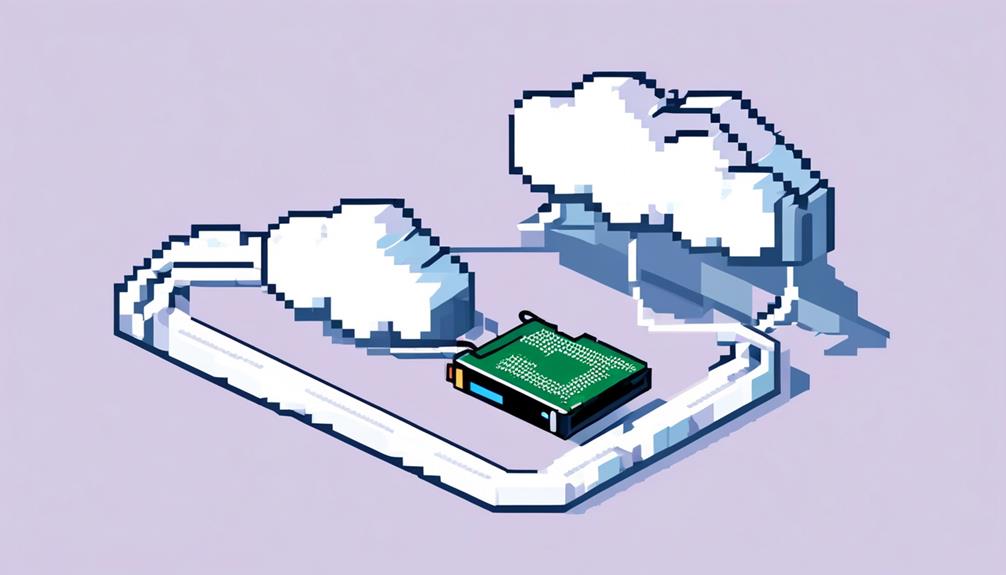In today's digital age, data loss and system failures can have significant consequences for businesses and individuals alike. That's where cloud backup hardware solutions come into play.
These physical devices offer a reliable and scalable way to backup and store critical data in the cloud.
But what are the key benefits of using these solutions? How do you choose the right one for your needs? And what does the future hold for cloud backup hardware?
Join us as we explore these questions and more in our in-depth discussion on cloud backup hardware solutions.
Key Takeaways
- Cloud backup hardware provides an additional layer of security for data, protecting against on-site disasters and hardware failures.
- It offers reliable off-site storage, ensuring data security and mitigating hardware failures through redundant systems.
- Cloud backup hardware enables automated backups, reducing human error and ensuring a consistent and regular backup process.
- It is a cost-effective solution, eliminating expenses associated with physical transportation of data and allowing for scalable storage that can easily expand as data requirements grow.
Benefits of Cloud Backup Hardware
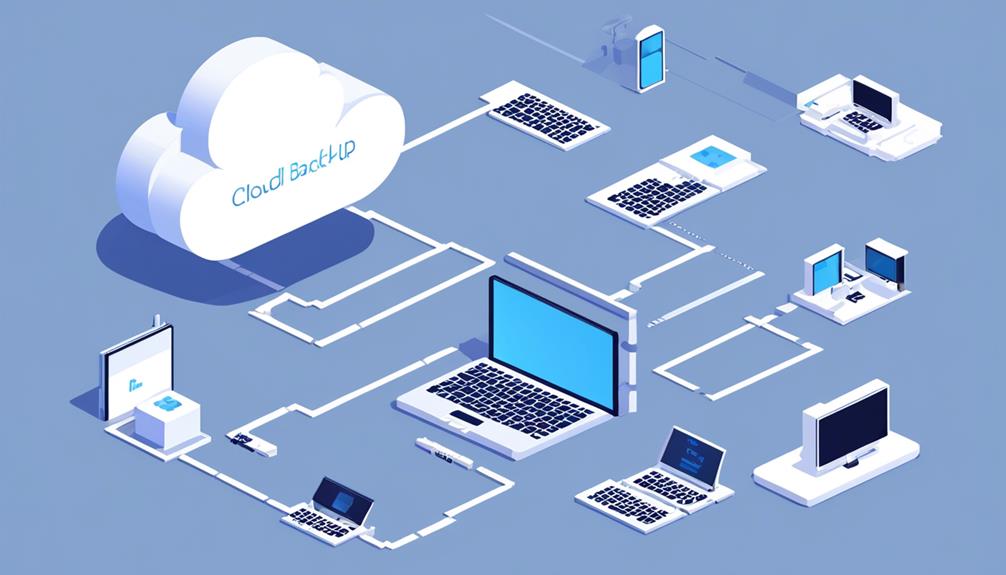
Cloud backup hardware solutions offer an additional layer of security for data, protecting against on-site disasters and hardware failures while providing reliable off-site storage. The benefits of cloud backup hardware are numerous and can greatly enhance data protection and recovery processes.
One major benefit of cloud backup hardware solutions is the assurance of data security. By storing data off-site, businesses are protected against on-site disasters such as fires, floods, or theft. This ensures that even in the worst-case scenario, data remains safe and accessible. Additionally, hardware failures can be mitigated through the use of redundant hardware systems, further reducing the risk of data loss.
Another advantage of cloud backup hardware solutions is the efficiency and automation they bring to the backup process. With automated backups, businesses can ensure that data is regularly and consistently backed up, reducing the chance of human error or negligence. This not only saves time but also minimizes the risk of data loss.
Quick and easy data recovery is another significant benefit of cloud backup hardware solutions. In the event of a hardware failure or disaster, businesses can swiftly retrieve their data from the off-site storage, minimizing downtime and reducing the impact on operations. This rapid recovery capability is crucial for maintaining business continuity and customer satisfaction.
Moreover, using cloud backup hardware solutions can be cost-effective compared to physical transportation of data. The expenses associated with shipping physical storage devices or renting additional physical storage space can be eliminated. Cloud backup hardware offers a scalable and flexible storage solution, allowing businesses to pay for the storage they need and easily expand as their data requirements grow.
Factors to Consider for Cloud Backup Hardware
With the benefits of cloud backup hardware solutions in mind, businesses must now consider several key factors when selecting the appropriate hardware for their cloud backup needs. These factors include storage capacity, pricing structure, features and compatibility, privacy and security, and reliability and speed.
To help businesses make an informed decision, the following table provides a summary of these factors:
| Factors | Description |
|---|---|
| Storage Capacity | The hardware should have sufficient storage capacity to accommodate the data size, taking into account the need for multiple file versions. |
| Pricing Structure | Evaluate the cost of maximum allowable data and consider any additional charges for extra capacity. |
| Features and Compatibility | Assess the availability of file sharing, mobile access, and local backup capabilities, and ensure compatibility with major operating systems and mobile devices. |
| Privacy and Security | Look for hardware solutions that allow personal encryption keys and provide high-level security measures to protect against unauthorized access. |
| Reliability and Speed | Consider the reliability of the hardware in terms of data center backups and transfer rates, ensuring efficient and consistent backup processes. |
When selecting cloud backup hardware, it is crucial to consider the storage capacity as it determines the amount of data that can be stored. Additionally, the pricing structure should be evaluated to ensure the cost-effectiveness of the service. Businesses should also assess the features and compatibility of the hardware, such as file sharing and mobile access, to meet their specific needs. Privacy and security are paramount, so selecting hardware that allows personal encryption keys and provides high-level security measures is essential to protect sensitive data. Finally, the reliability and speed of the hardware play a significant role in ensuring efficient and consistent backup processes.
Types of Cloud Backup Hardware Solutions
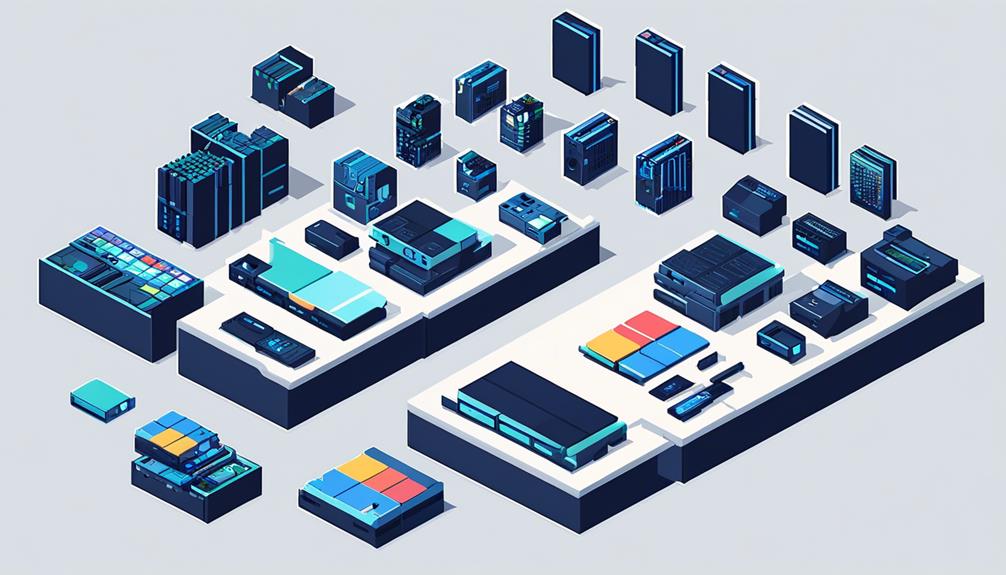
There are various types of hardware solutions available for cloud backup, each offering unique features and capabilities to meet the diverse needs of businesses. These hardware solutions provide an added layer of security and convenience to ensure the protection and accessibility of critical data.
Here are five types of cloud backup hardware solutions to consider:
- External hard drives: External hard drives offer a simple and cost-effective solution for backing up data. They can be easily connected to a computer or server, allowing for quick and efficient data transfer. External hard drives are portable and can be stored offsite for enhanced data protection.
- Network Attached Storage (NAS): NAS devices provide a centralized storage solution that can be accessed by multiple devices within a network. They offer scalable storage capacity and can be configured for automatic backups. NAS devices are suitable for businesses that require frequent data access and collaboration.
- Tape drives: Tape drives are a reliable and long-term storage solution for backup data. They offer high capacity and are resistant to physical damage and data corruption. Tape drives are commonly used in industries with strict data retention requirements, such as healthcare and finance.
- Cloud-to-cloud backup appliances: These appliances enable the direct transfer of data between different cloud backup services. They eliminate the need for downloading and re-uploading data, saving time and bandwidth. Cloud-to-cloud backup appliances are ideal for businesses that rely on multiple cloud backup services.
- Hybrid backup appliances: Hybrid backup appliances combine the benefits of local and cloud backup solutions. They provide both onsite storage for quick data recovery and offsite storage for disaster recovery. Hybrid backup appliances offer flexibility and scalability, making them suitable for businesses with dynamic data requirements.
Essential Features of Cloud Backup Hardware
To ensure the optimal functioning of cloud backup hardware, it is crucial to consider the essential features that enable reliable data encryption, secure transmission protocols, scheduled automatic backups, efficient data restoration, scalable storage capacity, and seamless integration with various operating systems and devices.
Reliable data encryption is a fundamental feature of cloud backup hardware. It ensures that the stored data remains confidential and protected from unauthorized access. Secure transmission protocols, such as SSL (Secure Socket Layer) or TLS (Transport Layer Security), guarantee that data is securely transferred between the user's device and the cloud storage servers.
Scheduled automatic backups are essential for maintaining data safety and consistency. Cloud backup hardware should provide the option to schedule backups at regular intervals, minimizing the risk of data loss and ensuring that the latest version of the data is always available for recovery.
Efficient data restoration is another critical feature of cloud backup hardware. Users should be able to restore their data quickly and easily in case of accidental deletion, corruption, or system failure. This feature enables seamless recovery and minimizes downtime.
Scalable storage capacity is vital to accommodate the growing storage needs of users. Cloud backup hardware should offer the flexibility to increase storage capacity as the amount of data increases over time. This ensures that users can continue to backup their data without any limitations.
Seamless integration with various operating systems and devices is crucial for user convenience and accessibility. Cloud backup hardware should be compatible with different operating systems, such as Windows, macOS, Linux, and mobile platforms. It should also support integration with various devices like desktops, laptops, smartphones, and tablets.
Scalable Options for Cloud Backup Hardware
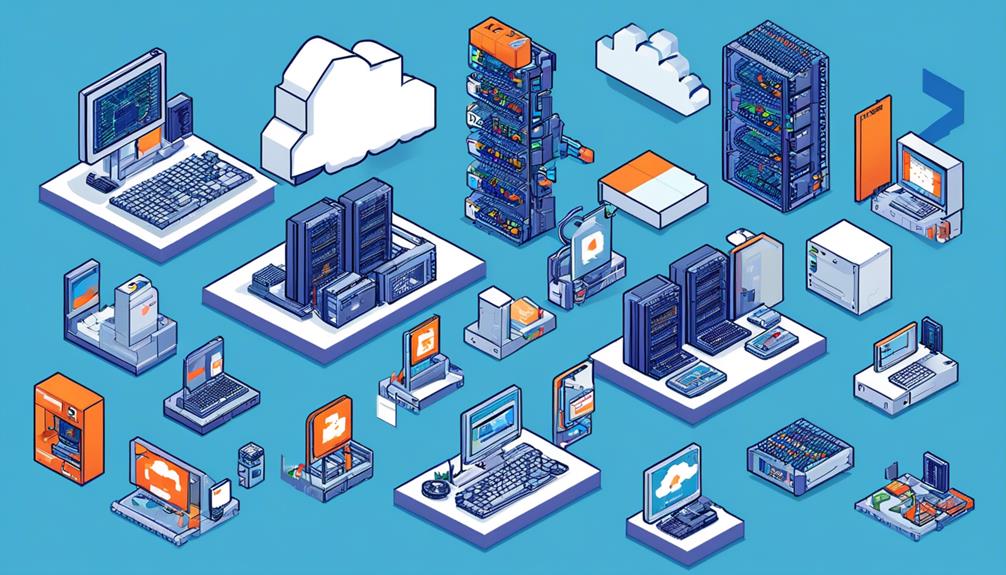
Scalable options for cloud backup hardware solutions provide businesses with the flexibility to expand their storage capacity as their data needs increase. These solutions offer the ability to customize backup and recovery solutions based on the specific requirements of the business, ensuring that data is protected and easily accessible.
Here are five key benefits of scalable options for cloud backup hardware:
- Cost Savings: Scalable options allow businesses to only pay for the storage capacity they need, eliminating the need for upfront investments in hardware. This helps to reduce costs and allocate resources more efficiently.
- Resource Optimization: With scalable cloud backup hardware solutions, businesses can easily increase or decrease their storage space based on demand. This ensures that resources are optimized and eliminates the risk of overprovisioning or underutilization.
- Seamless Integration: These solutions integrate with existing IT infrastructure, enabling businesses to expand their storage capacity without disrupting ongoing operations. This seamless integration ensures a smooth transition and minimizes downtime.
- Adaptability: The scalability of cloud backup hardware solutions allows businesses to adapt to increasing data volumes and evolving technology requirements. As data needs grow, businesses can easily scale up their storage capacity without any data loss or service interruption.
- Future Proofing: By implementing scalable options for cloud backup hardware, businesses can future-proof their backup solutions. These solutions can easily accommodate future growth and advancements in technology, ensuring that businesses can keep up with the ever-increasing volume of data.
Cloud Backup Hardware for Small Businesses
Cloud backup hardware solutions offer small businesses the opportunity to enhance their data protection and security measures while ensuring the flexibility to expand their backup capacity as their data needs grow. These hardware solutions provide physical devices for local data storage and backup, which can be integrated with cloud services for off-site redundancy. By incorporating cloud backup hardware into their infrastructure, small businesses can improve their backup applications and file servers' reliability and efficiency.
One of the key benefits of using cloud backup hardware for small businesses is the additional layers of data protection and security it offers. These hardware solutions often come with features such as encryption and secure transmission protocols, ensuring that sensitive data remains safe and secure during the backup process. This is especially important for small businesses that handle customer information or other confidential data.
Furthermore, cloud backup hardware for small businesses offers automatic and scheduled backups, ensuring that critical data is consistently and reliably protected. This eliminates the risk of data loss due to human error or system failures. Small businesses can set up automated backup processes that run in the background, providing peace of mind and reducing the need for manual intervention.
In addition to data protection and automatic backups, cloud backup hardware solutions also offer scalable storage options. Small businesses can start with a smaller storage capacity and easily expand as their data needs grow. This scalability ensures that small businesses can adapt to changing data requirements without the need for significant investments in new hardware.
Lastly, cloud backup hardware solutions provide seamless integration with existing IT infrastructure, making it easy for small businesses to adopt and manage their backup processes effectively. These solutions can be easily integrated with existing backup applications and file servers, minimizing downtime and disruption during the implementation process.
Cloud Backup Hardware for Enterprise Solutions

What advantages do cloud backup hardware solutions offer for enterprise data protection and disaster recovery?
Cloud backup hardware solutions for enterprise solutions provide a range of benefits that enhance data protection and disaster recovery capabilities. Here are five advantages of implementing cloud backup hardware solutions for enterprise needs:
- Scalability:
Enterprise cloud backup hardware solutions offer the flexibility to scale storage capacity as per the growing data volumes. This ensures that enterprises can easily accommodate increasing data requirements without compromising the backup process.
- Enhanced Security:
Cloud backup hardware solutions provide robust encryption mechanisms to safeguard sensitive enterprise data. These solutions adhere to industry standards and regulations, ensuring compliance with data security protocols.
- Efficient Data Transfer:
Enterprise cloud backup hardware solutions offer high-speed data transfer capabilities, enabling fast and efficient backup processes. This reduces the time required for backup operations, ensuring minimal disruption to business operations.
- Deduplication:
Cloud backup hardware solutions leverage deduplication technology to eliminate redundant data and optimize storage utilization. This results in significant cost savings and improved backup performance.
- Centralized Management:
Enterprise cloud backup hardware solutions provide centralized management capabilities, allowing administrators to monitor and control backup operations for multiple devices from a single interface. This simplifies the backup process, enhances efficiency, and streamlines disaster recovery procedures.
Best Practices for Implementing Cloud Backup Hardware
To ensure effective implementation of cloud backup hardware, it is crucial to follow best practices that prioritize data protection and disaster recovery.
Implementing a consistent backup schedule is essential to ensure regular updates of backup copies. This can include options for daily, weekly, monthly, or continuous scans, depending on the organization's requirements and the criticality of the data being backed up.
When selecting a cloud backup service, it is important to choose one that offers strong security measures. This should include encryption to protect data at rest and in transit, secure transmission protocols, and support for multi-factor authentication. These measures help safeguard the backup data from unauthorized access and ensure its integrity.
In addition to using cloud backup services, it is advisable to consider using built-in backup tools alongside standalone backup solutions. This approach provides comprehensive protection for data by leveraging both hardware and software solutions. It allows for greater flexibility and customization to meet specific backup requirements.
To protect against on-site disasters and hardware or software failures, it is recommended to backup critical data offsite. This can be done either in the cloud or at a remote facility. By having a copy of the data stored in a separate location, organizations can mitigate the risk of losing data due to localized incidents.
Security Considerations for Cloud Backup Hardware

After establishing best practices for implementing cloud backup hardware, it is imperative to focus on the security considerations associated with this hardware solution. When selecting a cloud backup hardware solution, it is crucial to prioritize the security of your backups and ensure the protection of your data. Here are five key security considerations to keep in mind:
- Encryption and Secure Transmission: Ensure that the cloud backup hardware offers strong encryption and secure transmission protocols to protect data during transfer and storage. Robust encryption algorithms, such as AES (Advanced Encryption Standard), provide an additional layer of security.
- Data Sensitivity: Consider the sensitivity of the data being backed up and choose a cloud backup hardware solution that provides high-level security measures. Sensitive data, such as financial or personal information, may require advanced security features like data anonymization or access controls.
- Private Encryption Key: Look for a service that offers a private encryption key option, ensuring privacy and security of backed-up data. With a private encryption key, only the key holder has access to the encrypted data, minimizing the risk of unauthorized access.
- Multi-Factor Authentication: Check if the cloud backup hardware solution provides multi-factor authentication for added security against unauthorized access. Multi-factor authentication requires users to provide multiple pieces of evidence, such as a password, a fingerprint, or a security token, before accessing the backups.
- Privacy Policy: Review the privacy policy of the cloud backup hardware solution to ensure data privacy and protection. Look for clear guidelines on data handling, retention, and sharing practices. A transparent and comprehensive privacy policy establishes trust and ensures compliance with relevant regulations.
Integration WITh Existing IT Infrastructure
Integration with existing IT infrastructure is a crucial aspect of cloud backup hardware solutions. This feature ensures seamless connectivity and compatibility with the organization's current systems, allowing for streamlined implementation and consolidation of backup processes with existing IT operations.
Seamless IT Integration
Seamless IT integration within existing infrastructure enables the smooth adoption and operation of a backup hardware solution within the organization's current technology framework. This integration ensures that the new backup hardware solution can work harmoniously with the organization's current systems, applications, and processes.
By leveraging the existing IT infrastructure, this integration minimizes disruption and maximizes efficiency. Additionally, it facilitates a smooth transition, reducing the learning curve and optimizing the use of resources and technology investments.
Seamless IT integration enables the backup hardware solution to complement and enhance the organization's current IT setup, ensuring a cohesive and integrated approach.
- Integration with existing systems, applications, and processes
- Minimizes disruption and maximizes efficiency
- Smooth transition with reduced learning curve
- Optimizes resource utilization and technology investments
- Enhances the organization's IT setup by complementing existing infrastructure.
Compatibility With Infrastructure
Ensuring compatibility with an organization's existing IT infrastructure is imperative for the successful integration and operation of a cloud backup solution.
Compatibility with infrastructure allows for seamless integration with current hardware, software, and network setups, minimizing the need for extensive reconfiguration or redevelopment of existing systems. By integrating with the existing IT infrastructure, the risk of disruptions and compatibility issues during deployment and ongoing usage is reduced.
This compatibility facilitates smooth data transfer, backup, and recovery processes across the entire IT infrastructure.
When selecting a cloud backup solution, it is essential to consider compatibility with infrastructure to avoid potential operational conflicts or inefficiencies.
Streamlined System Implementation
With streamlined system implementation, organizations can effectively integrate their cloud backup solution with their existing IT infrastructure, ensuring a seamless transition and minimal disruption to current operations. This integration allows for centralized management and monitoring of backups across all devices and systems within the IT environment.
By leveraging existing resources and configurations, the backup solution can operate efficiently. Streamlined system implementation enhances overall data protection and security while optimizing resource utilization in the IT environment.
Key benefits of this approach include:
- Centralized management and monitoring of backups
- Efficient utilization of existing resources and configurations
- Enhanced data protection and security
- Minimal disruption to current operations
- Seamless integration with existing IT infrastructure
Cost-effective Cloud Backup Hardware Solutions
Cost-effective cloud backup hardware solutions offer affordable hardware options. These solutions provide businesses with cost-efficient alternatives to traditional data storage methods. They reduce the need for expensive physical storage devices and simplify backup processes. Efficient backup processes and scalable storage solutions are also key features of these solutions. By leveraging these cost-effective cloud backup hardware solutions, organizations can optimize their backup strategies while minimizing costs.
Affordable Hardware Options
For those seeking affordable hardware options for cloud backup, there are several cost-effective solutions available in the market. Here are five options that provide reliable backup at affordable prices:
- iDrive Online Cloud Backup offers online and local backup in the same job at a cost-effective price of $79.50.
- Carbonite Safe is an affordable option at $71.99, providing automatic selection of important files, integration with Windows Explorer for backup status, and unlimited data.
- Livedrive, priced at $107.88, stands out with a flawless setup, good performance, and a syncing briefcase.
- Internxt Drive is a fantastically affordable option with extremely secure and private lifetime plans, offering a free 2TB account and a $108 per year plan for 2TB.
- Arq 7 Backup, priced at $49.99 for a stand-alone client, offers affordable online storage, local and online backup, and supports a wide variety of third-party online storage services.
These options provide cost-effective solutions for cloud backup hardware, ensuring data protection without breaking the bank.
Efficient Backup Processes
Efficient backup processes play a crucial role in ensuring the cost-effectiveness of cloud backup hardware solutions, optimizing data storage, and reducing operational costs. Cloud backup hardware solutions offer efficient backup processes that automate data protection and accessibility. By streamlining data backup, these solutions help in reducing costs and ensuring quick data recovery. Efficient backup processes cater to different data storage needs, allowing organizations to customize their backup strategies and allocate resources efficiently. This is achieved through features such as deduplication, compression, and incremental backups. Implementing efficient backup processes in cloud backup hardware solutions not only optimizes data storage but also minimizes operational costs by reducing the need for additional storage infrastructure.
| Features | Benefits |
|---|---|
| Deduplication | Reduces storage requirements |
| Compression | Minimizes data transfer and storage costs |
| Incremental backups | Improves backup speed and reduces network bandwidth usage |
Scalable Storage Solutions
Scalable storage solutions offer a highly adaptable and flexible approach to cloud backup hardware, catering to the evolving data storage needs of businesses. These cost-effective solutions provide the ability to expand storage capacity as data volumes grow, eliminating the need for huge upfront investments in storage infrastructure.
Here are five key advantages of scalable storage solutions:
- On-demand storage expansion: Businesses can start with minimal storage capacity and increase it as their data and backup requirements grow.
- Cost-effectiveness: Scalable storage solutions allow businesses to pay for the storage they actually need, avoiding over-provisioning and unnecessary spending.
- Seamless integration: These solutions seamlessly integrate with cloud backup services, ensuring efficient and reliable backup and recovery processes.
- Flexibility: Businesses can easily adjust their storage capacity according to changing needs, without incurring downtime or disruption.
- Scalability: Scalable storage solutions provide the scalability required to accommodate the exponential growth of data, enabling businesses to future-proof their backup infrastructure.
Performance and Reliability of Cloud Backup Hardware
The performance and reliability of cloud backup hardware solutions are critical factors in ensuring efficient and consistent data backup. The hardware's ability to handle large-scale data transfer and storage processes directly impacts the performance and reliability of cloud backup solutions. When selecting cloud backup hardware, it is essential to consider factors such as processing power, memory capacity, and network connectivity to ensure optimal performance.
High-performance hardware can significantly reduce backup and restore times, allowing organizations to meet stringent recovery time objectives.
Reliability is another crucial aspect to consider in cloud backup hardware solutions. Choosing hardware with robust encryption and security features is essential to ensure the reliability of data storage and protection against unauthorized access. This is especially important when dealing with sensitive or regulated data.
Additionally, redundancy and fault-tolerance mechanisms in cloud backup hardware contribute to the overall reliability and availability of backed-up data. Redundant components, such as power supplies and storage arrays, can minimize the risk of hardware failures and increase system uptime.
Regular maintenance and monitoring of the cloud backup hardware are vital to sustaining high performance and reliability levels. This includes conducting routine checks on hardware components, updating firmware and software, and implementing proactive measures to identify and address potential issues before they impact backup operations.
Monitoring tools can provide real-time insights into hardware performance, allowing administrators to optimize resource utilization and identify potential bottlenecks.
Backup and Recovery Strategies With Cloud Backup Hardware
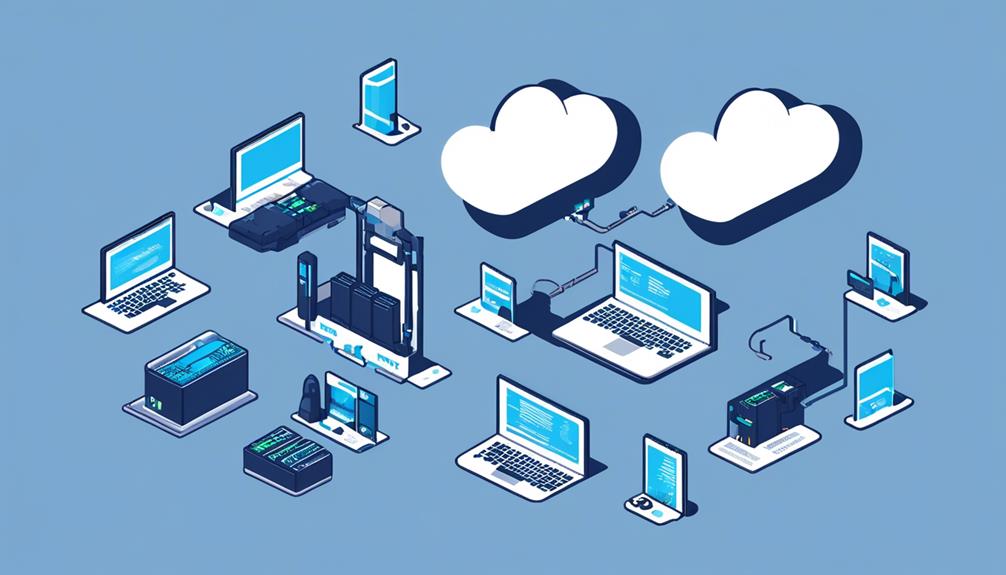
Backup and recovery strategies with cloud backup hardware involve implementing robust and reliable systems to ensure the secure and efficient restoration of data. With the increasing reliance on cloud data storage and the potential for data loss due to various factors, it is essential to have effective backup and recovery strategies in place.
Here are five key considerations for backup and recovery strategies with cloud backup hardware:
- Data Loss Prevention: Implementing backup strategies that ensure the protection of data from loss or corruption is crucial. This includes regular backups, redundant storage, and data integrity checks.
- Multiple Devices: Cloud backup hardware should support backup and recovery across multiple devices, including servers, desktops, laptops, and mobile devices. This allows for comprehensive data protection and easy restoration on different platforms.
- Efficient Backup Processes: Backup solutions should offer efficient and automated processes for backing up data. This includes incremental backups, deduplication techniques, and compression to optimize storage space and minimize backup time.
- Reliable Recovery Options: Cloud backup hardware should provide reliable and user-friendly recovery options. This includes quick and easy data restoration, the ability to restore specific files or entire systems, and versioning capabilities to recover previous versions of files.
- Security Measures: Backup and recovery strategies should prioritize data security. This includes encryption of data during storage and transmission, secure access controls, and the ability to manage encryption keys.
Future Trends in Cloud Backup Hardware Solutions
Moving forward, the evolution of cloud backup hardware solutions is expected to bring about significant advancements in data protection and storage efficiency. Future trends in cloud backup hardware solutions will likely focus on addressing the growing need for efficient backup and recovery processes, as well as the increasing amount of data that organizations and individuals need to store.
One of the key future trends in cloud backup hardware solutions is the integration of advanced encryption and security measures. As data privacy becomes a top concern, cloud backup hardware solutions will need to incorporate stronger encryption algorithms and robust security protocols to protect sensitive information from unauthorized access and cyber threats.
Scalability and flexibility will also be important considerations in the future. As the amount of data generated continues to grow exponentially, cloud backup hardware solutions will need to provide scalable storage options that can easily accommodate the expanding data volumes. Additionally, the ability to seamlessly integrate with various operating systems and devices will become crucial, ensuring compatibility and interoperability across different user environments.
Another potential future trend in cloud backup hardware solutions is the integration of artificial intelligence (AI) and machine learning (ML) technologies. By leveraging AI and ML algorithms, cloud backup hardware solutions can enable predictive analytics for data management and protection. This can help organizations optimize their backup strategies, identify potential data risks or anomalies, and enhance overall data protection.
Lastly, future trends may also focus on improving the speed and efficiency of backup and recovery processes. With businesses increasingly reliant on data for their operations, minimizing downtime and ensuring quick recovery becomes paramount. Cloud backup hardware solutions may incorporate technologies such as incremental backups or deduplication to reduce the time and resources required for backup and recovery operations.
Frequently Asked Questions
What Is a Cloud Backup Solution?
A cloud backup solution is a powerful tool that provides secure offsite storage for data, protecting it from on-site disasters.
With automatic encryption and versioning, these solutions ensure data security and ease of access.
Users can schedule fixed, continuous, or manual backups based on their preferences.
These solutions also offer monitoring options to configure backups for specific data, devices, and locations, ensuring data privacy and protection.
Storing backups offsite in the cloud or a remote facility is a cost-effective and efficient way to safeguard data.
What Is the Best Online Cloud Backup Service?
When considering the best online cloud backup service, it is important to evaluate the top features to consider, pros and cons of popular solutions, tips for efficient storage management, data security measures, and pricing plans of different providers.
By assessing these factors, users can make an informed decision based on their specific needs and requirements.
It is crucial to prioritize features such as automatic backups, unlimited storage, syncing capabilities, and strong encryption to ensure a reliable and secure cloud backup solution.
Can I Back up My Entire PC to the Cloud?
Yes, you can back up your entire PC to the cloud, providing a convenient and secure solution for protecting your data.
There are several online backup services available, each with their own pros and cons. To set up a complete PC backup on the cloud, you need to choose a suitable service, install their software, and configure the backup settings.
It is important to compare cloud backup options for different operating systems to ensure compatibility.
Cloud backup protects against data loss and disasters by providing regular backups and the ability to restore files. Additionally, it offers high-level security measures such as encryption during transfer and storage, protecting your data from unauthorized access.
What Is Hardware Backup?
Hardware backup refers to the process of creating redundant copies of data on physical devices. It is important to have hardware redundancy to ensure the availability and integrity of data in case of hardware failures.
There are various types of hardware backup devices, such as external hard drives, tape drives, and network-attached storage (NAS) devices. When choosing the right hardware backup solution, factors like capacity, reliability, and scalability should be considered.
Implementing hardware backup may pose challenges such as initial cost and maintenance. However, hardware backup offers benefits like faster data recovery and greater control over data security compared to cloud backup solutions.

